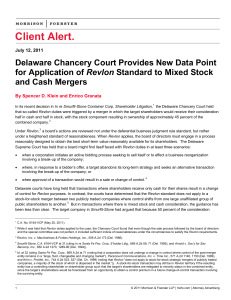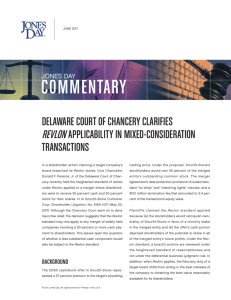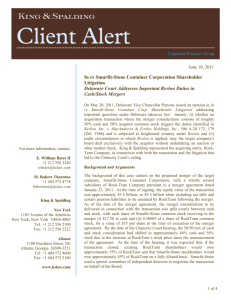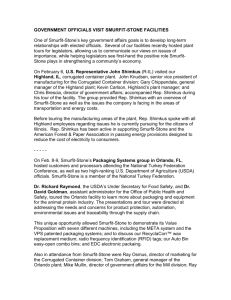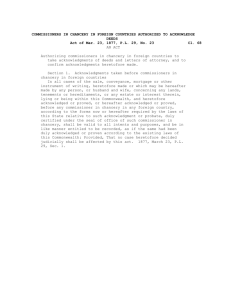Delaware Chancery Court Addresses Application of Revlon
advertisement
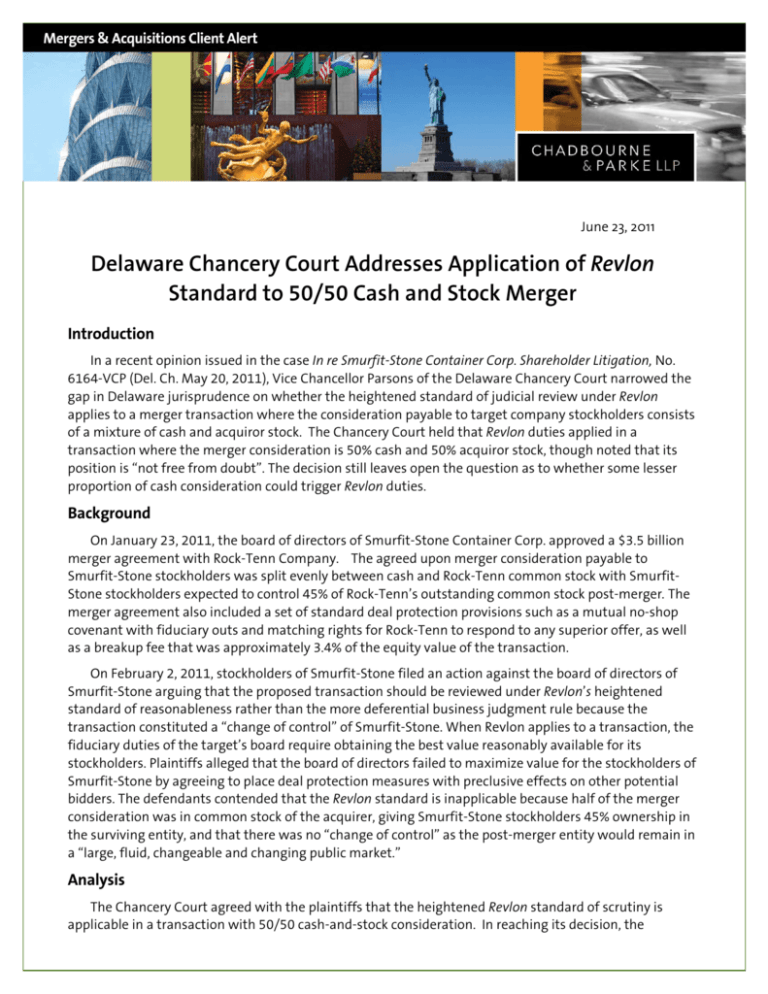
June 23, 2011 Delaware Chancery Court Addresses Application of Revlon Standard to 50/50 Cash and Stock Merger Introduction In a recent opinion issued in the case In re Smurfit-Stone Container Corp. Shareholder Litigation, No. 6164-VCP (Del. Ch. May 20, 2011), Vice Chancellor Parsons of the Delaware Chancery Court narrowed the gap in Delaware jurisprudence on whether the heightened standard of judicial review under Revlon applies to a merger transaction where the consideration payable to target company stockholders consists of a mixture of cash and acquiror stock. The Chancery Court held that Revlon duties applied in a transaction where the merger consideration is 50% cash and 50% acquiror stock, though noted that its position is “not free from doubt”. The decision still leaves open the question as to whether some lesser proportion of cash consideration could trigger Revlon duties. Background On January 23, 2011, the board of directors of Smurfit-Stone Container Corp. approved a $3.5 billion merger agreement with Rock-Tenn Company. The agreed upon merger consideration payable to Smurfit-Stone stockholders was split evenly between cash and Rock-Tenn common stock with SmurfitStone stockholders expected to control 45% of Rock-Tenn’s outstanding common stock post-merger. The merger agreement also included a set of standard deal protection provisions such as a mutual no-shop covenant with fiduciary outs and matching rights for Rock-Tenn to respond to any superior offer, as well as a breakup fee that was approximately 3.4% of the equity value of the transaction. On February 2, 2011, stockholders of Smurfit-Stone filed an action against the board of directors of Smurfit-Stone arguing that the proposed transaction should be reviewed under Revlon’s heightened standard of reasonableness rather than the more deferential business judgment rule because the transaction constituted a “change of control” of Smurfit-Stone. When Revlon applies to a transaction, the fiduciary duties of the target’s board require obtaining the best value reasonably available for its stockholders. Plaintiffs alleged that the board of directors failed to maximize value for the stockholders of Smurfit-Stone by agreeing to place deal protection measures with preclusive effects on other potential bidders. The defendants contended that the Revlon standard is inapplicable because half of the merger consideration was in common stock of the acquirer, giving Smurfit-Stone stockholders 45% ownership in the surviving entity, and that there was no “change of control” as the post-merger entity would remain in a “large, fluid, changeable and changing public market.” Analysis The Chancery Court agreed with the plaintiffs that the heightened Revlon standard of scrutiny is applicable in a transaction with 50/50 cash-and-stock consideration. In reaching its decision, the CPAM: 4032412.2 Chancery Court considered three types of transactions where Revlon duties may be applicable: pure stock consideration, pure cash consideration, and mixed consideration transactions. The Chancery Court noted that a 100% stock transaction where “ownership shifts from one large unaffiliated group of public stockholders to another,” is not a “change of control” and therefore does not trigger Revlon duties for the target company’s board of directors. This is because the stockholders of the target company still have the opportunity to receive a control premium in any future transactions involving the post-merger entity. In contrast, the Chancery Court pointed out that a 100% cash transaction would trigger Revlon duties as the transaction would be the final opportunity for stockholders of the target company to maximize the value of their investment before being foreclosed from deriving any future benefit from the post-merger entity or receiving any control premiums for future transactions. In the case of mixed consideration transactions, however, the Chancery Court acknowledged that Delaware courts have not provided clear guidance as to what portion of cash consideration would trigger Revlon duties. The Delaware Supreme Court, in In re Santa Fe Pac. Corp. Shareholders Litigation, 669 A.2d 59 (Del. 1995), ruled that Revlon did not apply to a transaction involving 33% cash consideration. However, in In re Lukens Inc. Shareholders Litigation, 757 A.2d 720 (Del. Ch. 1999), the Chancery Court held that 62% cash consideration does trigger Revlon duties because there was “no tomorrow” for a “substantial majority” of the stockholders. Based on such precedents, the Chancery Court reached the conclusion that the Revlon standard should apply to the proposed Smurfit-Stone merger transaction noting that (i) the 50% cash consideration is marginally closer to the percentage cash consideration in Lukens, and (ii) the 50% portion of the investment in Smurfit-Stone that would be paid in cash, and, therefore, deprived of the right to share in any future benefits or control premiums as a result of the cash-out is substantial enough—i.e., there is “no tomorrow” for 50% of each stockholder’s investment in Smurfit-Stone. In applying such conclusions to the facts, the Chancery Court nevertheless found that the board of directors of Smurfit-Stone satisfied its duties under Revlon. Noting that there is “no single path” for satisfying Revlon duties, the Chancery Court found that the board of directors had adequate information about the market, agreed to deal protection devices that did not have a preclusive effect, and acted appropriately during the merger process. The Chancery Court also stated that “reasonable minds may differ” about what constitutes a fair price and found that the plaintiffs did not show that the board of directors breached its Revlon duties by unreasonably accepting an inadequate price. Conclusion The Chancery Court’s determination that Revlon duties apply in transactions involving an even mix of cash and stock consideration provides important guidance in an area with a wide range of uncertainty. Nevertheless, it still remains uncertain whether Revlon will be applicable in transactions involving cash consideration greater than 33% but less than the 50% applicable in the Smurfit-Stone merger. It is also unclear whether the Delaware Supreme Court will adopt the Chancery Court’s analysis and ruling. A complete copy of the Smurfit-Stone case can be found here. * * * CLIENT ALERT CPAM: 4032412.2 2 Our client alerts are for general informational purposes and should not be regarded as legal advice. If you would like additional information or have any questions, please contact: Corporate New York Carlos T. Albarracín +1 (212) 408-1081 calbarracin@chadbourne.com Sey-Hyo Lee +1 (212) 408-5122 shlee@chadbourne.com Marc A. Alpert +1 (212) 408-5491 malpert@chadbourne.com Jonathan M.A. Melmed +1 (212) 408-1002 jmelmed@chadbourne.com Turgut Cankorel +1 (212) 408-1092 tcankorel@chadbourne.com J. Allen Miller +1 (212) 408-5454 amiller@chadbourne.com A. Robert Colby +1 (212) 408-5571 rcolby@chadbourne.com Richard Ross +1 (212) 408-5386 rross@chadbourne.com William Greason +1 (212) 408-5527 wgreason@chadbourne.com Edward P. Smith +1 (212) 408-5371 esmith@chadbourne.com Morton E. Grosz +1 (212) 408-5592 mgrosz@chadbourne.com Kevin C. Smith +1 (212) 408-1092 ksmith@chadbourne.com Charles E. Hord, III +1 (212) 408-5353 chord@chadbourne.com Ayşe Yüksel +1 (212) 408-1047 ayuksel@chadbourne.com Tae Sang Yoo +1 (212) 408-5345 tyoo@chadbourne.com Dubai Ayşe Yüksel +971 (4) 331-6123 ayuksel@chadbourne.com London Charez X. Golvala +44 (0) 20-7337-8020 cgolvala@chadbourne.com Claude S. Serfilippi +44 (20) 7337-8030 cserfilippi@chadbourne.com Washington Dana Frix +1 (202) 974-5691 dfrix@chadbourne.com Sean P. McGuinness +1 (202) 974-5680 smcguinness@chadbourne.com About Chadbourne & Parke LLP Chadbourne & Parke LLP, an international law firm headquartered in New York City, provides a full range of legal services, including mergers and acquisitions, securities, project finance, private funds, corporate finance, venture capital and emerging companies, energy/renewable energy, communications and technology, commercial and products liability litigation, arbitration/IDR, securities litigation and regulatory enforcement, special investigations and litigation, intellectual property, antitrust, domestic and international tax, insurance and reinsurance, environmental, real estate, bankruptcy and financial restructuring, executive compensation and employee benefits, employment law and ERISA, trusts and estates and government contract matters. Major geographical areas of concentration include Russia, Central and Eastern Europe, the Middle East and Latin America. The Firm has offices in New York, Washington, DC, Los Angeles, Mexico City, São Paulo, London, Moscow, Warsaw, Kyiv, Almaty, Dubai and Beijing. For additional information, visit: http://www.chadbourne.com/

